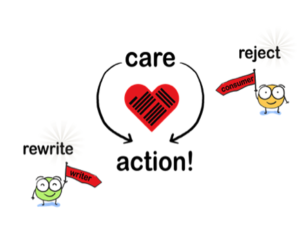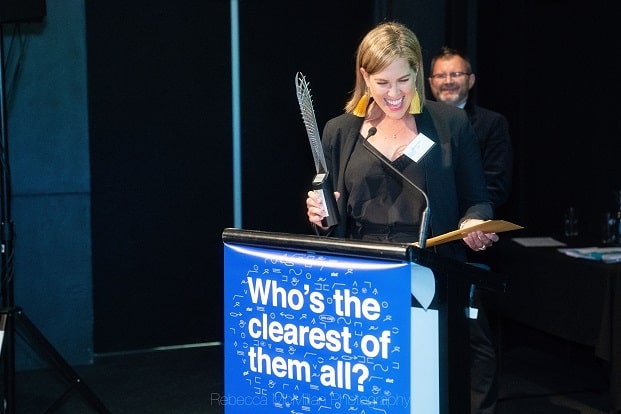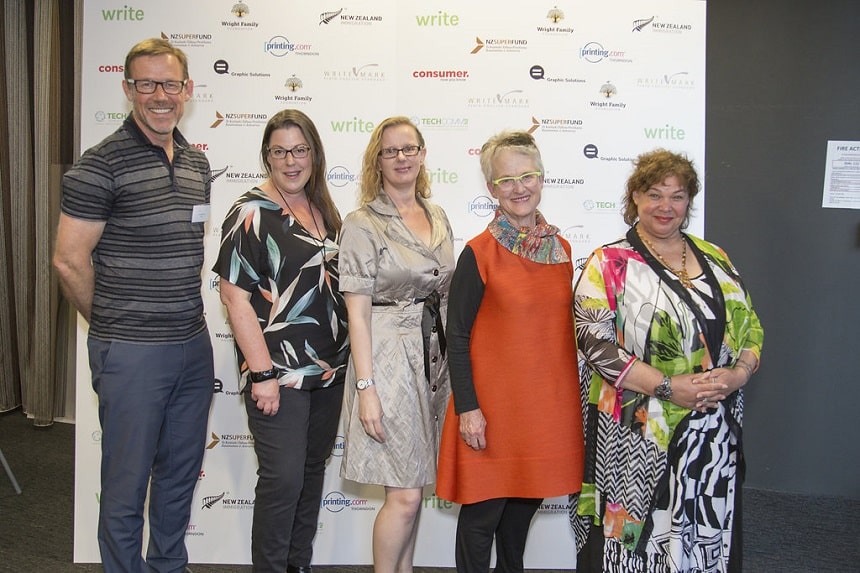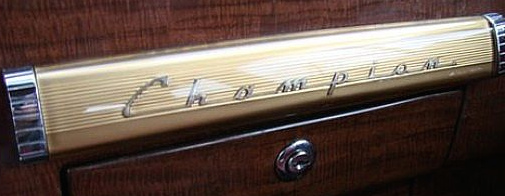Read on for part 2 of the inspiring speech given by Lynda Harris, Awards founder and CE of main sponsor Write Limited, at the 2018 Plain English Awards
I said that care can be a powerful catalyst for action if we will act on what we feel prompted to do. The three law firm owners I interviewed had done just that — they literally turned their values and sense of care into strong action.
So, believing what you do about the power of plain language, my question to you as both writer and consumer is ‘what action can you take that is bigger and bolder than before?’ How can you make your sense of care count?
As a writer your awareness of the benefits of plain language will naturally spur you on to rewrite. Make your effort meaningful! What significant project needs your support and insights? Which of your reader groups are most in need? Who must you persuade? Where can you make a difference?
As a consumer, it’s your voice that will bring change, so speak up! When you receive a document that is anything but reader-friendly, reject! Don‘t sign a difficult to understand contract. Query unclear instructions and ask for better. Tell companies what you think of their convoluted policies.
Let care equal action. Let care equal clear.

Find out more about the WriteMark Plain Language Standard
Melissa Mebus February 14th, 2019
Posted In: 2018 Plain English Awards, Industry awards, Social good
Tags: 2018 Plain English Awards, Care, clear communication, Social good

'We worked for 3 years to get this!' Winner of the Best Plain English Document — Private sector Jacqueline Taylor celebrates her success. Photo by Rebecca McMillan Photography.
What an amazing ceremony last night! Congratulations to all our 2018 winners — you deserved all the recognition you got. The feedback you each received from your judges truly shows that plain English is alive and kicking in New Zealand. It also shows that, as a Trust, we’re making great strides towards fulfilling our goals.
‘Keep going and spread the word!’
A special mention to the winners of our Plain English Champion — Best Individual or Team category. The work that’s gone into the Better Letters Project at the Ministry of Social Development is seriously changing the lives of everyday New Zealanders.
Our judges got it right when they said, ‘Keep going and spread the word! Imagine what New Zealand’s public service might look like if every government department took this approach!’
Find out about this year’s winners
Take a look at photographer Rebecca McMillan’s wonderful photos of the ceremony
Melissa Mebus November 16th, 2018
Posted In: 2018 awards ceremony, 2018 winners, Finalists, Social good, Winners
Tags: 2018 Plain English Awards, 2018 Winners, Champion, clear communication, People's Choice

Deciding on our shortlists was no mean feat. Photo by Cathryn Lavery on Unsplash.
From what we’ve heard from our judges, finalising this year’s shortlists has been no mean feat. We received many outstanding entries from across both the public and private sectors. We’re thrilled to announce which of those entries made our shortlists.
Take a look at our 2018 shortlists
We’ll make our next big announcement — this year’s finalists — some time around 19 October. Watch this space!
Melissa Mebus September 20th, 2018
Posted In: 2018 Plain English Awards, Judges, Shortlists
Tags: 2018 Plain English Awards, 2018 shortlists, clear communication, Industry awards

We were lucky enough to have five judges make last year's Awards ceremony. From left are Simon Hertnon, Kylie McGrath, Rachael Fogarty, Rachel McApline, and Maryland Spencer. Image by A Beautiful Photo
Meet our incredible line-up of plain English experts — from around New Zealand and the world — who’ll be judging entries in this year’s Awards. We’re proud to have such a wonderful pool of experts, and honoured that they’ve all offered their time to help us decide on our finalists and winners. We’re also grateful for the feedback they’ll give to all shortlisted entrants.
Judges for the 2018 Plain English Awards
Melissa Mebus September 3rd, 2018
Posted In: 2018 Plain English Awards, Communications, Judges, People's Choice awards, Plain English Awards
Tags: 2018 Plain English Awards, champions, clear communication, People's Choice, Plain English Awards

You now have 3 whole days more to submit your entries!
Entries for the 2018 Plain English Awards now close at midnight next Monday, 3 September. That means you’ve got 3 extra days to create your winning entry!
Read about our categories
See who won at last year’s Awards
Melissa Mebus August 30th, 2018
Posted In: 2018 Plain English Awards, Industry awards, People's Choice awards, Winners
Tags: 2018 Plain English Awards, clear communication, entry, Industry awards

It only takes a sentence to enter the Awards! Get transforming, using these simple steps.
Have you ever wondered what it would be like to enter an awards competition? The award for Best Plain English Sentence Transformation makes entering the Plain English Awards as simple as 1 – 2 – 3!
1. First, catch your sentence
Complex, long-winded sentences abound in official publications, on business websites, and around the office.
To find a suitable sentence, first of all, track down something that’s really long with multiple clauses, that maybe even includes more than one main idea, and also uses unnecessary, surplus words and phrases and convoluted language, which nevertheless might be regarded by some as adding a certain element of essential formality. See what we did there?
2. Rewrite your sentence in plain English
Rewrite your sentence in plain English so that it becomes simple and beautifully crafted. Keep your sentence short. If needed, you can use more than one sentence to express the ideas of your original text.
3. Enter your sentence in the award for Best Plain English Sentence Transformation
Enter your original and rewrite in the category that gives well-written sentences the attention they deserve. You can enter up to three sentence transformations in one entry. And feel free to enter more than once!
Enter the Best Plain English Sentence Transformation award
Check out last year’s winner here
Check out one of last year’s finalists here
And check out the other finalist from last year here
Anne-Marie Chisnall August 29th, 2018
Posted In: 2018 Plain English Awards
Tags: 2018 Plain English Awards, Best Plain English Sentence Transformation, clear communication, entry, recognition, sentence, transformation

Trophies are just the tip of the iceberg when it comes to the benefits of entering industry awards. Photo by Photo by Jennifer Latuperisa-Andresen on Unsplash
What’s the first image that comes to mind when you think about industry awards? For many people the answer might be trophies and photos in the newspaper, but those overt benefits are often just the tip of the proverbial iceberg.
The benefits of entering an industry award, and perhaps winning, go much deeper than you might first think. Public recognition is one of the most rewarding benefits, of course. But that benefit is often one of many.
Setting standards and demonstrating value
We’ve been running the Plain English Awards for 13 years. Over this time we’ve seen a steady increase in the quality of the entries. We’ve also seen a steady increase in interest in the Awards. And we’ve witnessed and recorded the benefits that organisations and individuals, as well as sponsors, reap from association with the Awards.
What are these benefits?
- Optimal benchmarking: the recipient of an award is seen as setting a standard
- Building credibility and strength: awards validate an organisation’s position with prospective customers and clients
- Demonstrating value: winning an award provides clear evidence of the value an organisation brings to its clients
- Communicating that you’re professional: winning an award shows that you’re a reputable professional whose achievements stand out
A long-term commitment to quality
What about those individuals and organisations that win more than once? This kind of achievement reinforces all the points above, and shows that you’ve committed to quality for the long term. What more could a client or customer wish for?
Read about how one organisation won our Best Organisation award in 2007 — and won again 8 years later in 2015.
Melissa Mebus August 10th, 2018
Posted In: 2018 Plain English Awards, Industry awards, Winners
Tags: 2018 Plain English Awards, clear communication, Industry awards

You, the public, call the shots in the People's Choice awards. Photo by Stuart Guest-Smith on Unsplash.
Members of the public can praise a paragon of clarity or put forward a perplexing paper in the People’s Choice category of the Plain English Awards.
You can enter documents and websites for two awards:
- Best Plain English Communication — for the most outstanding example of a plain English document or webpage nominated by a member of the public
- Worst ‘Brainstrain’ Communication — for a publicly available or widely used document or website that causes problems for many people.
How a Brainstrain award can help
The Brainstrain typically gets a lot of publicity. But even the winners of this category can turn the event into something positive. By shining a spotlight on entries in this category, awards organisers hope the entries will be rewritten in beautifully plain English.
Winners are welcome to blow their own trumpet
The winners of the Best Plain English Communication can share news of their win. They receive a logo to display on the winning publication and their email footer. They’ll also often have people blowing their trumpet for them — take a look at what stuff.co.nz had to say about last year’s winner, the Wellington City Council.
Entries come from everywhere
People nominate documents from likely and unlikely places.
The Wellington City Council’s newsletter Our Wellington Tō Tātou Pōneke won the ‘best’ award in 2017. Judges said vibrant design and friendly language made the document appealing. ‘Successfully combines drier council initiatives with more exciting information on events.’
In 2016, a paper from researchers NZIER with the forbidding title ISDS and Sovereignty won. It succinctly explained a key point of contention in the Trans-Pacific Partnership. It was ‘a breath of fresh air to readers used to struggling through lengthy, jargon-filled advisory documents,’ said the judges.
KiwiSaver documents have won both the ‘Best’ and ‘Brainstrain’ awards.
How you can enter
You have until 3 September to enter a website or document. You need to submit an electronic copy of the entry — so if you’re entering a printed document, you’ll need to scan it.
Entries must:
- be whole documents or webpages, not extracts
- be in current use for business purposes
- be owned by an organisation that operates in New Zealand
- not be owned by the organisation you work for
- not be a book, or an extract from a book.
Your identity will not be revealed to the organisations you nominate, or to the judges.
Enter the People’s Choice — Best Plain English Communication
Enter the People’s Choice — Worst ‘Brainstrain’ Communication
Melissa Mebus June 29th, 2018
Posted In: 2018 Plain English Awards, People's Choice awards
Tags: 2018 Plain English Awards, Brainstrain, clear communication, People's Choice

Last year's Plain English Champion — Best Organisation winners Hannah Morgan-Stone, left, William Meldrum, second from right, and Jerome Chapman, from Utilities Disputes, with Write CEO Lynda Harris. Photo by A Beautiful Photo.
We’re grateful this year to once again have the support of TechCommNZ, who’s sponsoring our Best Plain English Technical Communicator category. As part of their sponsorship, TechCommNZ recently published an article we wrote for them about our Trophy Tips Seminar. With their blessing, here’s that same article for your reading pleasure.
Winning an award is the best way to have your work recognised — or your team’s. And for business or technical writers, or people working in communications, the annual Plain English Awards are as good as it gets.
Tips for success from those in the know
In the build-up to the opening of this year’s Plain English Awards, we held a Trophy Tips Seminar in Wellington last month. We also broadcast this seminar through Facebook Live.
Before the seminar, we surveyed former winners and judges of the Awards to gather some tips for aspiring winners. While responses varied slightly, their main messages were clear and simple.
Best advice for aspiring winners
In short, the people we surveyed said that winning entries demonstrated similar traits.
- Short sentences
- Crystal-clear headings
- Readers’ needs prioritised
Common mistakes to avoid
To ensure your entry gets through the first phase of judging, survey respondents recommended that entrants avoid some common pitfalls.
- Unclear headings
- Long-windedness
- Excessive wordiness
- Poorly organised content
For more tips on how to submit a winning entry in the 2018 Plain English Awards, view our Trophy Tips Seminar.
Get in touch if you have any questions
You’re welcome to ask questions at any time: [email protected]. We’re here to help! See more about the Awards on our website.
Melissa Mebus June 21st, 2018
Posted In: 2018 Plain English Awards, Plain English Awards, Trophy Tips Seminar
Tags: 2018 Plain English Awards, clear communication, Finalists

Are you ready to be in the running for success?
What’s the best feedback you could hope for about a website that you or your organisation has created? What’s the greatest outcome you could imagine from a document your organisation has published? And what’s the most satisfying result you could wish for for the writers in your organisation?
How about, ‘This site was our clear and unanimous winner! We hope plain-writing professionals and trainers will use it as a good example of plain writing principles’? Or what about, ‘What’s not to like?’ And even, ‘It’s hard to see how the writers could have helped the readers more’?
The responses we’ve listed above are all true-blue pieces of feedback from judges at last year’s Plain English Awards. What kind of feedback do you think you’d get?

Going the extra mile for readers
Every year the Plain English Awards honours those individuals and organisations who have gone the extra mile to get the best outcomes for their readers. The Awards are a public pat on the back for plain English champions. They help to raise the bar for clear communication.
To decide on our champions, independent panels of plain English experts and advocates judge entries and decide on who’s best in each category. This year the Awards has 13 different categories to enter (or to be entered in).
Are you ready to be in the running?
Entries for the 2018 Plain English Awards are open. You have 3 months to get your entries in before they close on Friday, 31 August.
Enter the 2018 Plain English Awards through our website.
Melissa Mebus May 29th, 2018
Posted In: 2018 Plain English Awards, Plain English Awards
Tags: 2018 Plain English Awards, clear communication, People's Choice, Social good














